
In this unit we studied Ancient Egypt, we looked at the geography and a little bit of the culture.
In the IB learner profile there are 10 profiles these include:
- Caring
- Balanced
- Open-Minded
- Reflective
- Principled
- Communicator
- Risk-Taker
- Thinkers
- Inquirers
- Knowledgeable
In this unit we did not use all the learner profiles, or cover them all but we did use a few of them in our work.
- Open-Minded- I think through the unit we had to be open-minded because there were rituals, traditions and certain things that ancient Egyptians did where we had to stop and think "Yes, this might be strange but it was part of their culture." We couldn't just label things as "stupid" or "dumb" right away we had to think about it from a different point-of-view.
- Knowledgeable - Through this unit we also had to be knowledgeable about the different things that we learn. Even though this profile is kind of obvious it was very important. Being knowledgeable means that you can take information in and then remember it using it for other tasks that require knowledge about the subject. One time in the unit that presented our knowledge on ancient Egypt, was playing the Jeopardy game.
- Inquirers - I think through this unit we had to be inquirers because as the last project of Ancient Egypt we had to pick something about Egypt and then create a presentation about it. To learn about the topic that we picked we had to be interested about it and have the want to find out more about the topic.
In IB we also have the Approaches to learning categories these include:
1. Organizational
2. Collaborative
3. Communication
4. Information Literacy
5. Reflection
6. Problem Solving and Thinking Skills
Through this unit I think that the approaches that we have covered include:
1. Organizational – Through this unit we had to be organized, this is because we had quite a few small projects going on. We had to organize time so that we could be efficient and get our work done while making it good quality. We also got a lot of papers that we had to keep organized so that when we needed something specific we would have it with us.
2. Collaborative – We only had one project where we needed to collaborate but it was a project that we didn’t really have that long of a period to work on, even though it was quite simple, we had to work on the project together quickly and well.
How did the physical environment affect the development of civilizations?
In every civilization the surroundings of the physical environment effect the development because physical environment can either kill a civilization or build it up. An example is a civilization that would start in the desert compared to one that starts near a lush, green river the civilization near the river is definitely going to develop much faster and become so much better than the civilization that starts in the desert. This is because the civilization near the river has so many more advantages and “gifts” than the desert has. A river can provide food for people, irrigation, land that is fertile for farming and much more. The physical environment can affect the civilization because it either gives the civilization more and builds it up or it take away, causing things like droughts, or famine.

No comments:
Post a Comment